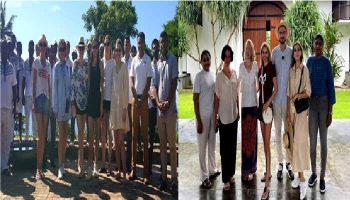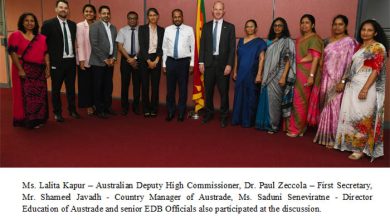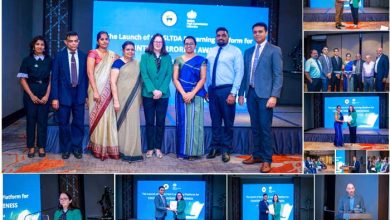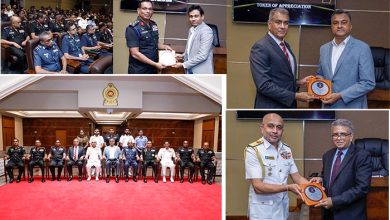Creating a cultural bridge to take local Handicrafts to an international level
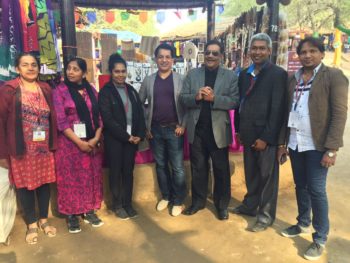
By Sureshni Pilapitiya
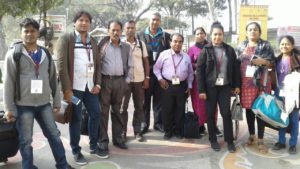 The proven fact that handicrafts have been a part and parcel of the Sri Lankan culture was aptly highlighted by the country’s representation at the 32nd International Suraj Kundh Mela 2018, held from February2nd to 18th, at Surajkund, District, Faridabad, India on a grand scale. This was a collaborative effort carried out by the Hands of Sri Lanka Foundation with the Indian High Commission in Sri Lanka.
The proven fact that handicrafts have been a part and parcel of the Sri Lankan culture was aptly highlighted by the country’s representation at the 32nd International Suraj Kundh Mela 2018, held from February2nd to 18th, at Surajkund, District, Faridabad, India on a grand scale. This was a collaborative effort carried out by the Hands of Sri Lanka Foundation with the Indian High Commission in Sri Lanka.
A delegation of skilled artisans from Sri Lanka participated at this spectacular festival – which brought an opportunity to share and connect with the Indian and international artisans coming from across the globe. As initiated by Deshabandhu Dr. Buddhi Keerthisena , president , Hands of Sri Lanka foundation, this opportunity set a stage for the skilled Sri Lankan artisans to participate and showcase their skills, and receive the recognition they deserved and also a value for their hard work.
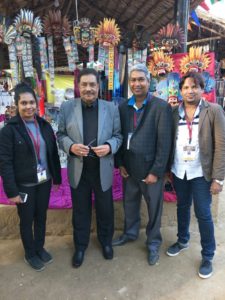 As the chairman of the National Crafts Council. Dr.Keerthisena was able to increase the number of artisans each year that started with two members in 2008 and also giving them an opportunity to gain knowledge about the arts and cultures of the other parts of the world. Most of the Sri Lankan designers and artisans were happy that they participated at the Suraj Kundh Mela, not only because of the marketing oppotunities, which is most important for Sri Lankan artisans, but also in promoting Sri Lankan handicrafts, and sharing the knowledge with the Indian artisans and also with the international artisans who came from various parts of the world.
As the chairman of the National Crafts Council. Dr.Keerthisena was able to increase the number of artisans each year that started with two members in 2008 and also giving them an opportunity to gain knowledge about the arts and cultures of the other parts of the world. Most of the Sri Lankan designers and artisans were happy that they participated at the Suraj Kundh Mela, not only because of the marketing oppotunities, which is most important for Sri Lankan artisans, but also in promoting Sri Lankan handicrafts, and sharing the knowledge with the Indian artisans and also with the international artisans who came from various parts of the world.
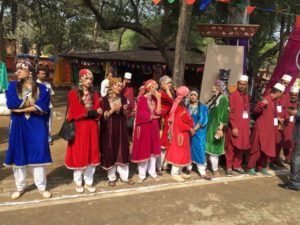 Dr Keerthisena expressing his views about this unique festival said: “ With the participation in this Mela, our artisans can gain a lot of opportunities as well as can share a lot of creative ideas with the Indian and international artisans. Hence this is a place where you find the markets for your products and also the vital knowledge and the experience. It is a great experience. Suraj Kundh Mela is a huge mela in this part of the world. I think this event is held in an area which is over 100 acres and more than 1000 artisans from India itself participating at this Mela. The other important fact is that these artisans are looked after by the Indian Haryana Tourism Authority, as well as the Indian Government. All their meals, accommodation, expenses, travel expenses are paid by the Indian Government and Haryana Tourism. In my opinion continuation of this event for 32 years without a break itself is a great thing. Each year it seems to be growing and the growth is very unique. Sustainability is another key factor. Thus, those people involved in the programme are doing a tremendous service for the craft industry of India as well as the neighbouring countries, and other nations as well.”.
Dr Keerthisena expressing his views about this unique festival said: “ With the participation in this Mela, our artisans can gain a lot of opportunities as well as can share a lot of creative ideas with the Indian and international artisans. Hence this is a place where you find the markets for your products and also the vital knowledge and the experience. It is a great experience. Suraj Kundh Mela is a huge mela in this part of the world. I think this event is held in an area which is over 100 acres and more than 1000 artisans from India itself participating at this Mela. The other important fact is that these artisans are looked after by the Indian Haryana Tourism Authority, as well as the Indian Government. All their meals, accommodation, expenses, travel expenses are paid by the Indian Government and Haryana Tourism. In my opinion continuation of this event for 32 years without a break itself is a great thing. Each year it seems to be growing and the growth is very unique. Sustainability is another key factor. Thus, those people involved in the programme are doing a tremendous service for the craft industry of India as well as the neighbouring countries, and other nations as well.”.
The history of handicrafts in Sri Lanka dates back to Sangamitta therani’s time, when she visited Sri Lanka carrying a sampling of the Sri Maha Bodhi and she was accompanied by 18 artisans who were experts in various crafts. The expansion of handicrafts was further enhanced by the colonial influence, especially from the Dutch regime. The Dutch introduced the intricate designs of ‘’Beeralu lace’’, an activity which has to be done with great patience and care, and and also mastered by local women, especially in the South of the Island. It has turned out be a family tradition and also a way of self-employment at present.
‘’ In the future we look forward to participate in this programme in a much better and a stronger way through our organization, “Hands of Sri Lanka”. We think craft is an important part and parcel of the strong cultural relationship we have with India. The development of these crafts goes back to India’s Asoka era. During King Asoka’s period, Sangamitta therani came to Sri Lanka with the scared Bo tree and with her 18 sectors of craft personnel came to Sri Lanka. These craftsmen started producing their work and passing their expertise from generation to generation up to now. As this tradition of craft is a part of strong wall connecting our two countries India should give its fullest support and cooperation to our crafts and in turn Sri Lanka also must expand its marketing strategies towards India ’’ Dr. Keerthisena further added.
According to Dr. Keerthisena, our craft is highly recognized in the Indian market. Our products are considered to possess a unique quality. Especially our wooden products, lace, masks, Batik, wood carvings, jewellery etc were very highly regarded and the local artisans who participating the Suraj Kundh Mela and Delli Haart were able to sell their products successfully. The demand was such they also got orders from various Indian shops and marketing places to supply these products. Further he said: “It is a unique thing to know that our craft is becoming popular in India, thus we should be given a special place, as the country of the origin for our craft was India during the ancient times, and also considering the great friendship and relationship we have with India .Thus, a good market share should be given to Sri Lanka for our handicrafts and also extend further opportunities.
“ In this regard the Indian High Commission in Sri Lanka is supporting in a big way to popualarize our crafts through various marketing programmes such as “Shilpa Kala” ande at “Dilli Haart” and extending many opportunities to participate in various marketing programmes. “Hands of Sri Lanka” would like to extend its sincere thanks , honor and gratitude to the Indian High Commission in Colombo for their tremendous support. Therefore our organization is looking forward to market our handicraft products in India, and to continue in participating in various Melas, exhibitions, trade fairs in India, The present High Commissioner for India in Sri Lanka, H.E Tharanjeeth Singh Sandhu, first secretary Mr. Nithin Yuola are doing their best to help us in the regard” Dr Keerthisena stressed.
Dr.Keerthisena praised the efforts initiated by India-Sri Lanka foundation in bringing down designers from India to train our local artisans, introducing new designs and ideas. “With this training as well as participation in Indian markets will help local craftsmen. This will not only strengthen, the long standing relationship between the two nations but also will create a bridge to enable local handicraft industry to get its due recognition and also enhancing the livelihood of our craftsmen and thus contributing to the country’s economic growth”, he concluded.


